See also
- Order of the House of Orange
- Principality of Orange
- Prince of Orange, a title originally associated with the Principality of Orange
The House of Orange is a branch of the House of Nassau active in European politics.
House of Orange may also refer to:
Orange most often refers to:
Orange-Nassau may refer to:
A prince is a male ruler or a male member of a monarch's or former monarch's family. Prince is also a title of nobility, often hereditary, in some European states. The female equivalent is a princess. The English word derives, via the French word prince, from the Latin noun prīnceps, from primus (first) and caput (head), meaning "the first, foremost, the chief, most distinguished, noble ruler, prince".
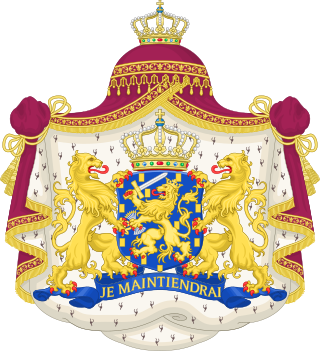
The House of Orange-Nassau is the current reigning house of the Netherlands. A branch of the European House of Nassau, the house has played a central role in the politics and government of the Netherlands and elsewhere in Europe, particularly since William the Silent organised the Dutch Revolt against Spanish rule, which after the Eighty Years' War (1568–1648) led to an independent Dutch state.
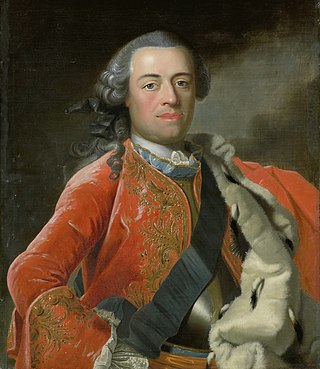
William IV was Prince of Orange from birth and the first hereditary stadtholder of all the United Provinces of the Netherlands from 1747 until his death in 1751. During his whole life he was furthermore ruler of the Principality of Orange-Nassau within the Holy Roman Empire.
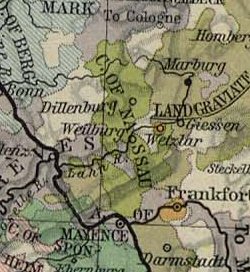
The County of Nassau was a German state within the Holy Roman Empire and later part of the German Confederation. Its ruling dynasty, the male line of which is now extinct, was the House of Nassau.
Nassau may refer to:

A dynasty is a sequence of rulers from the same family, usually in the context of a monarchical system, but sometimes also appearing in republics. A dynasty may also be referred to as a "house", "family" or "clan", among others.
Fürst is a German word for a ruler as well as a princely title. Fürsten were, starting in the Middle Ages, members of the highest nobility who ruled over states of the Holy Roman Empire and later its former territories, below the ruling Kaiser (emperor) or König (king).

Prince of Orange is a title originally associated with the sovereign Principality of Orange, in what is now southern France and subsequently held by sovereigns in the Netherlands.

Katzenelnbogen is the name of a castle and small town in the district of Rhein-Lahn-Kreis in Rhineland-Palatinate, Germany. Katzenelnbogen is the seat of the Verbandsgemeinde Aar-Einrich.

In heraldry, cadency is any systematic way to distinguish arms displayed by descendants of the holder of a coat of arms when those family members have not been granted arms in their own right. Cadency is necessary in heraldic systems in which a given design may be owned by only one person at any time, generally the head of the senior line of a particular family.

The Principality of Orange was, from 1163 to 1713, a feudal state in Provence, in the south of modern-day France, on the east bank of the river Rhone, north of the city of Avignon, and surrounded by the independent papal state of Comtat Venaissin.
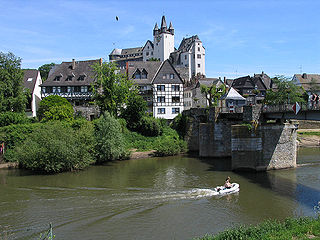
Diez an der Lahn is a town in Germany's Rhein-Lahn district in Rhineland-Palatinate, on the borders of Hesse. Diez is the administrative seat of the municipality of Diez.
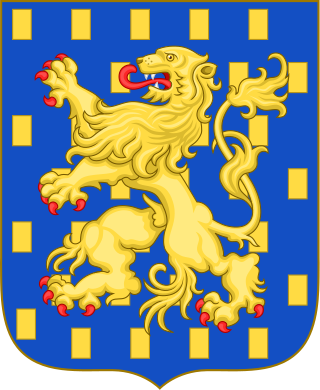
The House of Nassau is a diversified aristocratic dynasty in Germania. It is named after the lordship associated with Nassau Castle, located in present-day Nassau, Rhineland-Palatinate, Germany. The lords of Nassau were originally titled "Count of Nassau", then elevated to the princely class as "Princely Counts". Early on they divided into two main branches: the elder (Walramian) branch, that gave rise to the German king Adolf, and the younger (Ottonian) branch, that gave rise to the Princes of Orange and the monarchs of the Netherlands.

The Anscarids or the House of Ivrea were a medieval dynasty of Frankish origin which rose to prominence in Northern Italy in the tenth century, even briefly holding the Italian throne. The main branch ruled the County of Burgundy from the eleventh to fourteenth centuries and it was one of their members who first declared himself a count palatine. The cadet Castilian branch of Ivrea ruled the Kingdom of Galicia from 1111 and the Kingdoms of Castile and León from 1126 until 1369. The House of Trastámara, which ruled in Castile, Aragon, Naples, and Navarre at various points between the late 14th and early 16th centuries, was an illegitimate cadet branch of that family.

The House of Lippe is the former reigning house of a number of small German states, two of which existed until the German Revolution of 1918–19, the Principality of Lippe and the Principality of Schaumburg-Lippe.

The House of Chalon-Arlay was a French noble house, a cadet branch of the House of Ivrea. The founder of the house is John I of Chalon-Arlay, fifth son of John, Count of Chalon. When John III lord of Arlay married to Mary de Baux, princess of Orange, the House acquired the principality of Orange.
Nassau-Orange-Fulda was a short-lived principality of the Holy Roman Empire from 1803 to 1806. It was created for William Frederick, the son and heir of William V, Prince of Orange, the ousted stadtholder of the abolished Dutch Republic after the Batavian Revolution of 1795.
Kingdom of Albania may refer to: